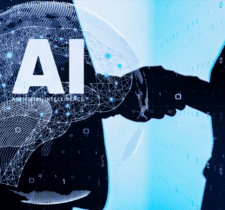Aphaia’s Managing Partner Cristina Contero Almagro offered a presentation about the Future and Regulation of Artificial Intelligence in Spain at the “AI and Society: Challenges and Opportunities” event organised by NAIR Center in Pamplona on 21st November.
On 21st November, Pamplona became the center of critical discussions about the intersection of artificial intelligence (AI) and society, holding the event “NAIR ConciencIA – AI and Society: Challenges and Opportunities of the Future” which brought together leaders, policymakers and industry experts to explore the transformative power of AI and its ethical challenges. Aphaia’s Managing Partner, Cristina Contero Almagro, participated in the discussions by presenting actionable insights on responsible AI governance and future regulatory frameworks.
Topics and Participants
Organized by the NAIR Center, this event focused on understanding and addressing the opportunities and challenges posed by AI in societal contexts. The event featured keynote speakers, including Manuel González Bedia, Director General of Strategic Planning in Advanced Digital Technologies and the New Language Economy and leading AI consultants like Dr. Nerea Luis. Discussions covered a variety of topics, such as the economic impact of AI, its role in job creation, ethical dilemmas, and the importance of inclusive leadership in AI-driven innovation.
Attendees included researchers, government officials, and business leaders, all contributing to a dynamic exchange of ideas. Panels tackled subjects like ethical AI, the digital skills gap, and technological inclusivity. The agenda aimed to foster a holistic understanding of AI’s societal footprint, preparing stakeholders for the next wave of technological advancements.
Key topics included:
- Socioeconomic impacts of AI: exploring how AI can both bridge and widen gaps in the digital economy.
- Current AI regulation: insights into European and national legislative frameworks, emphasizing the need for a robust governance structure.
- Promoting responsible AI initiatives: highlighting tools and frameworks for ensuring transparency, fairness, and inclusivity in AI applications.
Aphaia’s Participation: Ethical Action in AI
Cristina Contero Almagro, representing Aphaia, delivered a presentation titled “From Ethical Dilemmas to Action: Regulation and Future of Responsible AI in Spain”. The talk emphasized the critical need for balancing innovation with accountability, focusing on both current challenges and proactive solutions for ethical AI integration.
Key insights include:
- Socioeconomic impact of AI:
Both risks and benefits of using AI were discussed, covering areas where action is required such as skill gaps or algorithmic bias and other aspects that will bring a positive change, like the increase in productivity or the creation of new jobs.
- Regulatory Landscape:
The EU AI Ethics Guidelines for Trustworthy AI set the basis of the current AI Regulation, with a risk level approach.
- Examples of successful and failed implementation of trustworthy AI:
There are multiple initiatives both at public and private levels that are intended to foster the adoption of trustworthy AI systems. Whereas there were some projects that did not achieve the intended results in the past such as the Tay chatbot or the Google ethic’s board, this helped organisations and society to learn about AI capabilities and society demands.
- Next five years:
In the next five years we will see early results of the application of the AI Regulation and hopefully increasing awareness and commitment about the importance of AI ethics, by developers, users and other stakeholders.
What is next?
The event highlighted the need for collective action in shaping AI’s role in society. With diverse perspectives and actionable frameworks, it created a space for addressing the challenges of ethical AI while leveraging its transformative potential.
Aphaia’s contribution showed our commitment with divulgation about the importance of responsible AI practices. By advocating for flexible regulatory frameworks with industry participation, Aphaia continues to lead the dialogue on aligning technological progress with societal values.
As the landscape of AI evolves, forums like these remain indispensable for fostering collaboration and ensuring that innovation serves the greater good.








